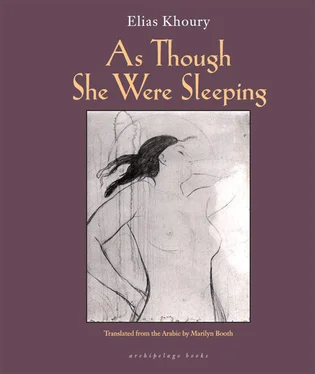Of course I remember it all.
But a person doesn’t remember anything that happened before the age of three.
Well, I do.
Fine, fine, he said, and didn’t go on. Ever since the incident of the broken goblet, the expression tayyib tayyib had become his polite way of letting her know he believed she was lying. Listening to her stories, suddenly he would realize that his mind was incandescent with the thought that she was lying.
You’re lying to me, Milia, he would say, his voice sweeping the specters of her words from his eyes as he gave her a tight smile. She would never answer. Milia had long been accustomed to these words, which her mother used to say, and which the nun said, and which her brothers said. Only Musa believed her — and believed in her. Once he told her he believed in her. No, she said. A person must not believe in people. A person believes only in God.
But my mama believes in the nun.
I don’t like nuns at all.
But she is holy.
When had this conversation happened? Had Musa really said he believed in her, or was she confusing her dreams with what had truly happened?
She told Musa he didn’t know her. No, she hadn’t said that. She believed Musa had not really seen her, not the real Milia, not even once. How could he have seen her since he had not gone inside her dreams? He had never seen the tawny-skinned girl who ran through thorns and felt no pain. But on the day he brought the photograph home and hung it on the wall she felt afraid of the light that radiated outward from the eyes. He saw her then but did not really attend to the truth that the image on the wall revealed to him, without any effort on his part to seek it.
Why this photograph? she asked, stepping back. Take it away.
It’s so you’ll stay here with us, said Musa. When I miss you I know where to come to see you. When I’m longing for you I can say so to your face.
Milia walks alone, the baby nearly ready to emerge from her belly, sorrow encasing her, and fear. Nine months of fear, Milia told Tanyous. But whence had this strange obscure old man come, this figure who so resembled the prophets of old?
The goblet, Milia remembers. He had brought her a wineglass poured to the brim with a slightly yellowish liquid. No. . he had not actually given her the glass. He left it on the windowsill. Milia had been alone in the house; Mansour was in Jaffa. She heard a knock at the window. She wrapped herself up hurriedly in the coverlet and told herself out loud that she would not open her eyes. Her fear of the dream mingled with her fear of the night. She squeezed her eyes even more tightly shut, turned onto her right side, and focused on the ringing in her ears. She went limp, acceding to the power of the ringing and her drowsiness. With that sound from outside she felt the baby churning in her womb, kicks battering her intestinal wall.
She opened the window to see him creeping among the trees. Amm Tanyous! she shouted. She wrapped her fingers around the glass set on the windowsill. The liquid inside was like gold. She brought the glass to her lips and drank a single drop, enough to send her into a floating reverie. She set the goblet down on the table next to the bed and fell immediately into a deep sleep.
How did the white wine turn into red wine by morning? And why had Mansour not seen the wine? Why this blood-red stain tinting her fingertips, which she couldn’t remove with soap and water?
Tanyous was the sign. He was an old man: who knew how many years he had lived? He wore a black robe as monks did, and his beard was white and long and bushy. His eyes were sunk deeply into his face, sharp points of light, and his voice gurgled and rattled as if coming from deep in his belly.
He had never seen this man in his life, Mansour told her.
But he’s a monk, said Milia.
A monk would not be wandering around the streets like this, said Mansour. I’ve never seen him, not even once, and my aunt, who has lived in these parts for twenty years, has never heard anyone speak of him. Anyway, there’s no one from Beirut in this town. If Beirutis work around here, they’re in Tiberias or Haifa. Enough, woman. Tomorrow or the next day, inshallah , you’ll have your baby and that will be the end of these infernal dreams.
Mansour was convinced that the strange things his wife saw in her dreams were brought on by her pregnancy and her sense of loneliness. His mother had told him that when a woman gets pregnant she goes a bit eccentric. Some women even sleep all day long. Some eat dirt, and some. . well, God help them! When she had been pregnant with him, his mother told Mansour, she couldn’t stop eating tiny pickled lemons even though they turned her insides into flames.
No need to worry, son, she comforted him. These are just the symptoms of pregnancy. Even though Mansour was persuaded by his mother’s view and held to his hope that after the birth Milia would stop her odd behaviors — no longer going out for her daily dreamlike wanderings through the town’s alleyways — Mansour was certain that the true problem was Nazareth. It’s an insane place, he said to his wife. He had discovered this truth the very moment they set foot in the new house. Something had shifted in Milia’s gaze to the point where he could no longer read her feelings through the shadows hovering over her eyes. It’s what love means, he had told her, trying to explain how he would know her feelings. I read your eyes and I know. Only the lover can read eyes. It is the sign of love, and it means I love you.
But I don’t know how to read eyes, she answered. Does this mean you love me more than I love you?
Definitely, he said. Come on, now, look into my eyes and learn how to read them!
They were in the garden of the old house. Mansour put his hand out to take hers but she gave him no more than her fingertips, and her cheeks went red. She dropped her lashes. She said she was reading.
But your eyes are closed.
I read when they’re closed.
Milia was not lying to Mansour. She read other people with her eyes closed. What baffled her, though, after they married, was that she never saw Mansour in her dreams. It had worried her at first; it felt as though she was being unfaithful to the man she had married. She didn’t tell him this, although she felt guilty. Can a woman tell her husband she’s betraying him? Of course he would react with anger — but only until he knew what this peculiar betrayal consisted of, and then he would laugh and say he knew all about it and had no need to hear her confession.
Milia did know somehow that the time when she would find Mansour inside her dreaming had not yet arrived. When Tanyous told her that he was waiting for her newborn to arrive before he could pass on, and that he had come to love her very much and wanted to take her with him, she felt the soles of her feet turn icy with fear.
No, she said. She did not want to go with him. What she wanted to do, she told him, was stay in Nazareth. After all, she was the daughter of a carpenter. She would open a shop for her son here so that he could learn the blessed Messiah’s craft. The old man smiled. Her son, he said, would live in a faraway place, and she was consecrated to see what no one before her had seen. And she would discover who Mansour was all at once. For time has no meaning except for those who have not been granted the blessing of vision.
But I do know him — he is my husband.
No, no. You will come to know things about him that even he does not know, Tanyous replied.
But those things don’t concern me, she said.
Everything in its time, the old monk answered her.
When she came to this town her first question had been about the location of the Messiah’s home. And then Mansour saw everything in this woman change. Her eyes clouded over and seemed encircled by little halos that were nothing like the shadowy circles around her eyes that he used to notice in Beirut. He cursed the hour in which he had decided to make this town his home.
Читать дальше












